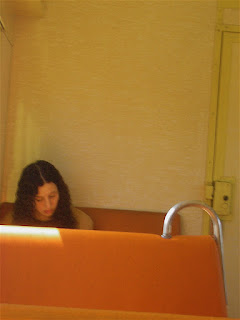
So you are 32, Tom Coryat, walking prodigious distances through northern France each day. Talking with who ever you find. Remember the words of his friend, John Gifford:
“the wonder of this age, which doth admire
How Travell, Wit and Art do all conspire
To make him Table-talke, and pointed at,
Filling mens mouthes, and eyes with Coryate.
let us not forget that, if we start thinking Tom is shy.

And when you arrive every evening at your place of rest, you eat, drink, talk and sleep. So when do you write this all down, Thomas? Do you dictate to yourself as you walk? Is your memory as prodigious as your feet? Was it that you are scared to write in case you look like a spy?
He was born in 1577; his Queen, Elizabeth, had been excommunicated from the Catholic church by Papal Bull seven years before. Throughout his childhood in Odcombe, Somerset, and his years at Oxford (Martin Amis’s college, though Coryat’s influence is negligible in later Amis), Elizabeth was funding and supporting protestant “cells” across most of the Channel “littoral”: from Brittany to the Netherlands.
In response Continental Catholic resistance to Elizabeth was widespread and cunning. There was an almost permanent terrorist threat to English shores: in the seminaries at Douai and St Omer, among many, priests were trained for their English “mission.” Martyrdom was the fashion…
…It was the supreme privilege, promised divine goods. “Of which only divine grace could make them worthy.” Peter Unwin writes in “The Narrow Sea.”
Once trained the priests were smuggled into England through small ports. Of these religious “spies” perhaps the most famous is Edmund Campion. “So the faith was planted; so it is to be restored,” he said in his “martyr-statement”. He was caught, tortured and executed. So eventually was Elizabeth’s rival throne claimant, Mary Queen of Scots. In 1587.
These were ideological times: the Pope’s secretary openly announced the price on Elizabeth’s head: “that guilty woman of England…whoever sends her out of the world…no only does not sin but gains merit…”
The Spanish Armada – off Calais, though it sounds as though it should be off Ibiza – was survived in 1588; by Tom’s adulthood another was expected in 1599 but was a no-show. The trial for the Gunpowder Plot of 1605 – the 9/11 of Jacobean England, sorry but it was – is a short memory, occurring two years before Tom’s journey. In the same year, 1606, Thomas Palmer wrote “Essay of the Means how to make our travels into Foreign Countries the more profitable and honourable.” He told most not to bother. Not unless it was strictly necessary. So that is Tom out, for a start. Lucky he was the Prince of Wales’ man.

Children, the infirm, anyone a bit mad, women: none of them should travel, Palmer says. He was most worried about the “barbarous lusts” of even the most friendly seeming continental. And so, in a twist on now, decadence was “there”, not “here”. Tom Coryat must have known this wasn’t exactly the case. Along with the Gunpowder Plot trial, London of 1606 is remembered for the orgy that took place at a party of the King of Denmark, brother to Anne, wife of the new King, James the First. Ben Jonson was commanded to write a “Black Masque”. The Queen and her friends painted their faces black, everyone got very drunk, and revels were…revelled.
They were still talking about it in 1608.
But sex is one thing; the main fear of travel was being “doubled”. Like one of Ben MacIntyre’s WW2 spies. Innocents going abroad might return a secret catholic. Tom does his forceful bit to disavow us of any catholic leanings on his part. Still it is fun to speculate: perhaps he was a spy – for someone. Of his temptation by vice, we have to wait, formally, for Venice.

Though I won’t be able to wait that long to consider Tom and Sex.
No comments:
Post a Comment